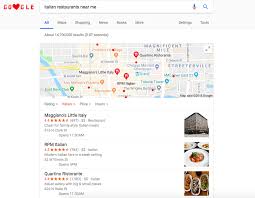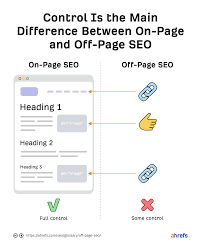Understanding On-Page SEO and Off-Page SEO
Search Engine Optimization (SEO) is crucial for improving your website’s visibility and ranking on search engine results pages. There are two main components of SEO: On-Page SEO and Off-Page SEO.
On-Page SEO
On-Page SEO refers to the optimization strategies that you can implement on your website to improve its search engine ranking. This includes optimizing your content, meta tags, headings, images, URLs, and internal linking structure. By focusing on relevant keywords, high-quality content, and user-friendly design, you can enhance the overall user experience and make it easier for search engines to crawl and index your site.
Off-Page SEO
Off-Page SEO involves activities that take place outside of your website to improve its authority and credibility. This includes building backlinks from reputable websites, engaging with social media platforms, submitting your site to online directories, and participating in online communities. By creating a strong online presence and earning quality backlinks from other sites, you can boost your website’s reputation and increase its chances of ranking higher in search results.
Both On-Page SEO and Off-Page SEO are essential components of a successful digital marketing strategy. By combining these two approaches effectively, you can enhance your website’s visibility, attract more organic traffic, and ultimately achieve better rankings on search engines like Google.
Remember to regularly monitor your website’s performance, analyze key metrics, and adjust your SEO strategies accordingly to stay ahead of the competition in the ever-evolving digital landscape.
7 Key Benefits of On-Page and Off-Page SEO for Boosting Website Performance
- Optimizes website content for targeted keywords
- Improves user experience and site usability
- Increases organic traffic to your website
- Can be easily updated and optimized as needed
- Builds credibility and authority for your website
- Generates high-quality backlinks from reputable sources
- Supports long-term sustainability of search engine rankings
Challenges of On-Page and Off-Page SEO: Time, Competition, and Algorithm Changes
- On-Page SEO can be time-consuming, requiring regular updates and optimization of content and technical elements.
- Off-Page SEO efforts may not always yield immediate results, as building backlinks and online reputation takes time.
- Over-optimization in On-Page SEO, such as keyword stuffing or excessive internal linking, can lead to penalties from search engines.
- Off-Page SEO activities like link building can be challenging and competitive, especially in saturated markets.
- Changes in search engine algorithms can impact both On-Page and Off-Page SEO strategies, requiring constant adaptation.
- Neglecting either On-Page or Off-Page SEO can result in suboptimal performance and hinder overall search engine rankings.
Optimizes website content for targeted keywords
Optimizing website content for targeted keywords is a key benefit of both On-Page SEO and Off-Page SEO strategies. By incorporating relevant keywords strategically within the content, meta tags, headings, and URLs of a website, On-Page SEO helps search engines understand the context and relevance of the site’s content to improve its ranking for specific search queries. On the other hand, Off-Page SEO contributes to this process by building quality backlinks from external sources using anchor text that includes targeted keywords, further signaling to search engines the importance and authority of the website for those specific terms. This coordinated effort enhances the overall visibility and search engine ranking of the website for its target audience.
Improves user experience and site usability
By focusing on On-Page SEO and Off-Page SEO strategies, websites can significantly enhance user experience and site usability. On-Page SEO optimization ensures that content is relevant, well-structured, and easy to navigate, making it more engaging for visitors. Off-Page SEO efforts, such as building quality backlinks and engaging with social media platforms, can increase a website’s credibility and visibility, ultimately attracting more users. By prioritizing these SEO practices, websites can create a seamless and enjoyable browsing experience for their audience while also improving overall site usability.
Increases organic traffic to your website
By implementing both On-Page SEO and Off-Page SEO strategies, you can significantly increase organic traffic to your website. On-Page SEO optimization ensures that your website is easily discoverable by search engines through relevant keywords, high-quality content, and user-friendly design, attracting more visitors who are actively searching for information related to your products or services. Off-Page SEO efforts, such as building quality backlinks from reputable websites and engaging with social media platforms, help enhance your website’s authority and credibility, leading to higher search engine rankings and increased visibility among potential customers. Together, these approaches work synergistically to drive more organic traffic to your website, ultimately boosting your online presence and expanding your reach in the digital landscape.
Can be easily updated and optimized as needed
One significant advantage of both On-Page SEO and Off-Page SEO is that they can be easily updated and optimized as needed. With On-Page SEO, website content, meta tags, headings, and other on-site elements can be adjusted and refined to better target relevant keywords and improve overall performance. Similarly, Off-Page SEO efforts such as building backlinks, engaging on social media, and participating in online communities can be continuously optimized to enhance the website’s authority and credibility. This flexibility allows website owners to adapt to changing trends, algorithms, and user behaviors effectively, ensuring that their site remains competitive in the dynamic digital landscape.
Builds credibility and authority for your website
By implementing both On-Page SEO and Off-Page SEO strategies, you can effectively build credibility and authority for your website. On-Page SEO optimization helps establish your website as a reliable source of information by focusing on high-quality content, relevant keywords, and user-friendly design. Off-Page SEO activities such as building backlinks from reputable sites and engaging with social media platforms further enhance your website’s credibility in the eyes of search engines and users. Building credibility and authority through a comprehensive SEO approach not only improves your search engine rankings but also fosters trust among your target audience, ultimately leading to increased organic traffic and better online visibility.
Generates high-quality backlinks from reputable sources
One significant advantage of both On-Page SEO and Off-Page SEO is their ability to generate high-quality backlinks from reputable sources. By implementing On-Page SEO strategies such as creating valuable content and optimizing website elements, you can attract organic backlinks from other websites seeking authoritative and relevant sources. Similarly, Off-Page SEO tactics like building relationships with industry influencers and engaging in guest blogging can help secure backlinks from trustworthy sites within your niche. These high-quality backlinks not only improve your website’s credibility and authority in the eyes of search engines but also drive more organic traffic to your site, ultimately enhancing your overall online presence and search engine rankings.
Supports long-term sustainability of search engine rankings
By focusing on both On-Page SEO and Off-Page SEO strategies, websites can support the long-term sustainability of their search engine rankings. On-Page SEO ensures that the website’s content is optimized with relevant keywords, meta tags, and user-friendly design, making it easier for search engines to index and rank the site. Meanwhile, Off-Page SEO activities such as building quality backlinks and engaging with online communities help establish the website’s authority and credibility in the digital landscape. Together, these efforts contribute to maintaining a strong online presence and sustainable search engine rankings over time.
On-Page SEO can be time-consuming, requiring regular updates and optimization of content and technical elements.
One significant drawback of On-Page SEO is the time and effort it demands. Constantly updating and optimizing content, meta tags, headings, images, URLs, and internal linking structures can be a time-consuming process. Ensuring that all technical elements are in line with best practices and search engine algorithms requires ongoing attention. This continuous need for maintenance and optimization can be challenging for website owners and marketers who have limited resources or time constraints.
Off-Page SEO efforts may not always yield immediate results, as building backlinks and online reputation takes time.
One significant drawback of Off-Page SEO is that its efforts may not always yield immediate results. Building backlinks and establishing a strong online reputation are time-consuming processes that require patience and consistency. Unlike On-Page SEO changes that can show quicker improvements in search engine rankings, Off-Page SEO strategies such as link building and social media engagement often take time to generate noticeable outcomes. However, despite the delay in seeing results, the long-term benefits of a solid Off-Page SEO strategy can significantly enhance a website’s authority and visibility in the digital landscape.
Over-optimization in On-Page SEO, such as keyword stuffing or excessive internal linking, can lead to penalties from search engines.
Over-optimization in On-Page SEO, such as keyword stuffing or excessive internal linking, can have detrimental consequences for a website’s search engine ranking. Search engines like Google penalize websites that engage in such practices by lowering their visibility in search results or even removing them from the index altogether. This can result in a significant loss of organic traffic and hinder the website’s overall performance. It is crucial for website owners and digital marketers to strike a balance between optimization efforts and maintaining a natural and user-friendly experience to avoid falling victim to search engine penalties.
Off-Page SEO activities like link building can be challenging and competitive, especially in saturated markets.
In highly competitive and saturated markets, one significant drawback of Off-Page SEO activities such as link building is the inherent challenge and fierce competition involved. Building quality backlinks from reputable websites can be a daunting task, requiring substantial time, effort, and resources to stand out among competitors vying for the same digital real estate. Navigating this competitive landscape demands strategic planning, creativity, and persistence to secure valuable backlinks that can positively impact a website’s search engine ranking and overall online visibility.
Changes in search engine algorithms can impact both On-Page and Off-Page SEO strategies, requiring constant adaptation.
Changes in search engine algorithms pose a significant challenge for both On-Page and Off-Page SEO strategies. As search engines like Google frequently update their algorithms to improve user experience and combat spammy practices, website owners and digital marketers must stay vigilant and adapt their SEO tactics accordingly. What worked well yesterday may not be as effective today, making it essential to monitor algorithm changes, analyze their impact on search rankings, and make necessary adjustments to ensure continued visibility and success in the competitive online landscape.
Neglecting either On-Page or Off-Page SEO can result in suboptimal performance and hinder overall search engine rankings.
Neglecting either On-Page or Off-Page SEO can have detrimental effects on a website’s performance and search engine rankings. Focusing solely on On-Page SEO without considering Off-Page factors like backlinks and social signals may limit the website’s authority and credibility in the eyes of search engines. Similarly, neglecting On-Page optimization while solely concentrating on building external links through Off-Page SEO efforts can lead to poor user experience and reduced relevance for targeted keywords. To achieve optimal results and improve search engine rankings, it is crucial to strike a balance between both On-Page and Off-Page SEO strategies to create a comprehensive and effective digital marketing approach.




